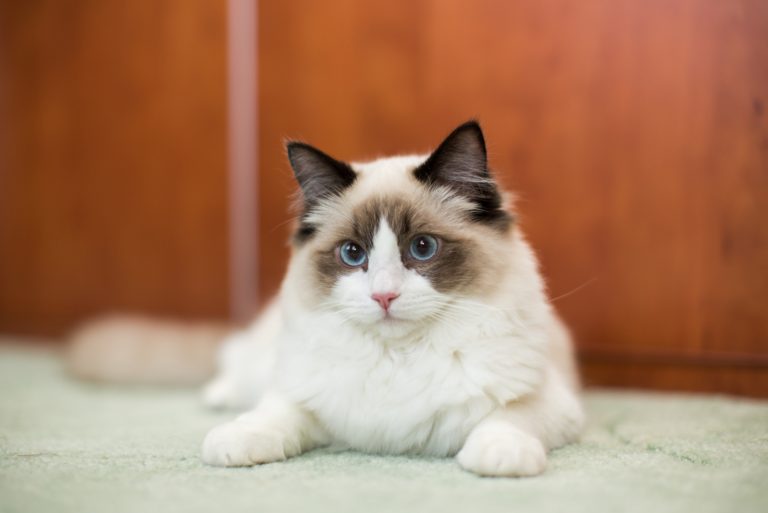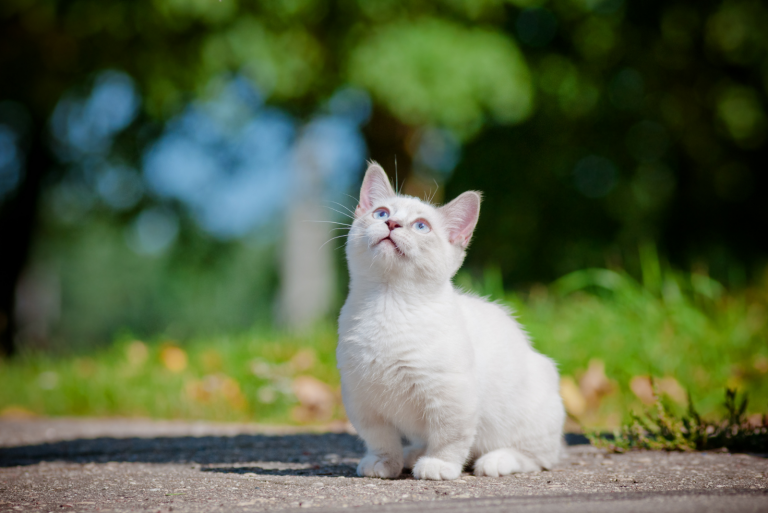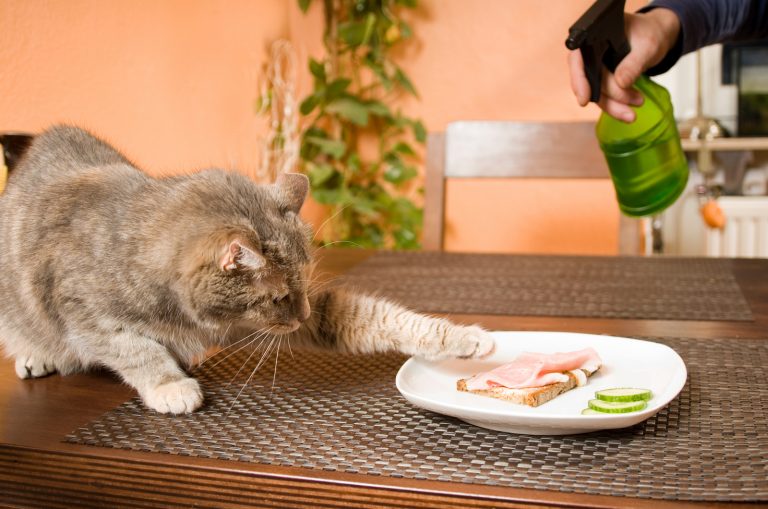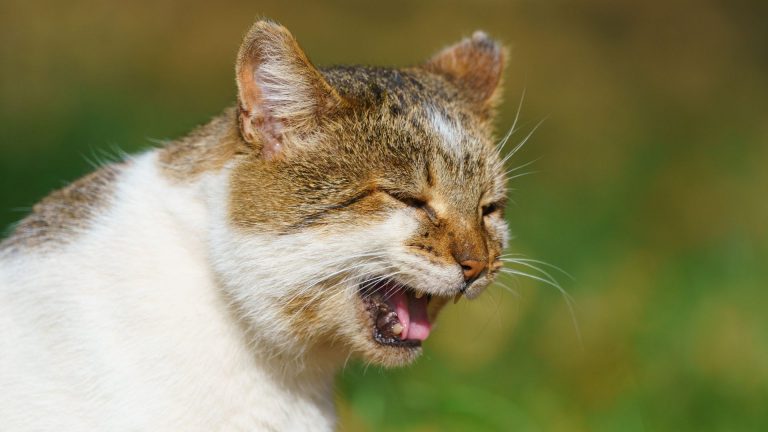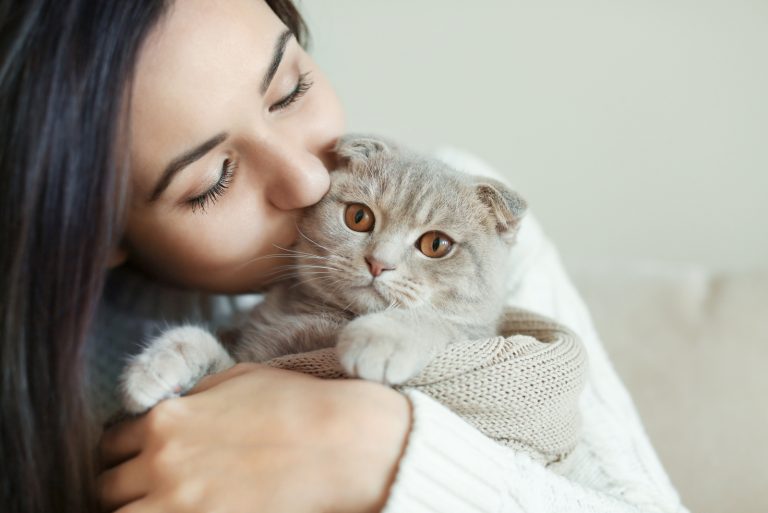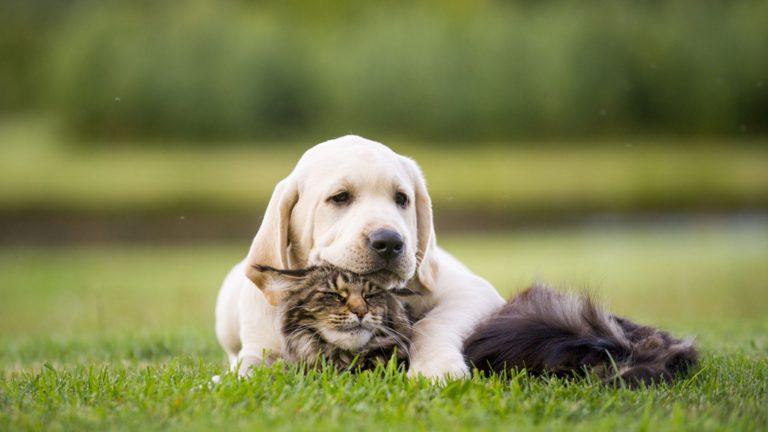My Cat Keeps Sneezing But Seems Fine – What Should I Do?
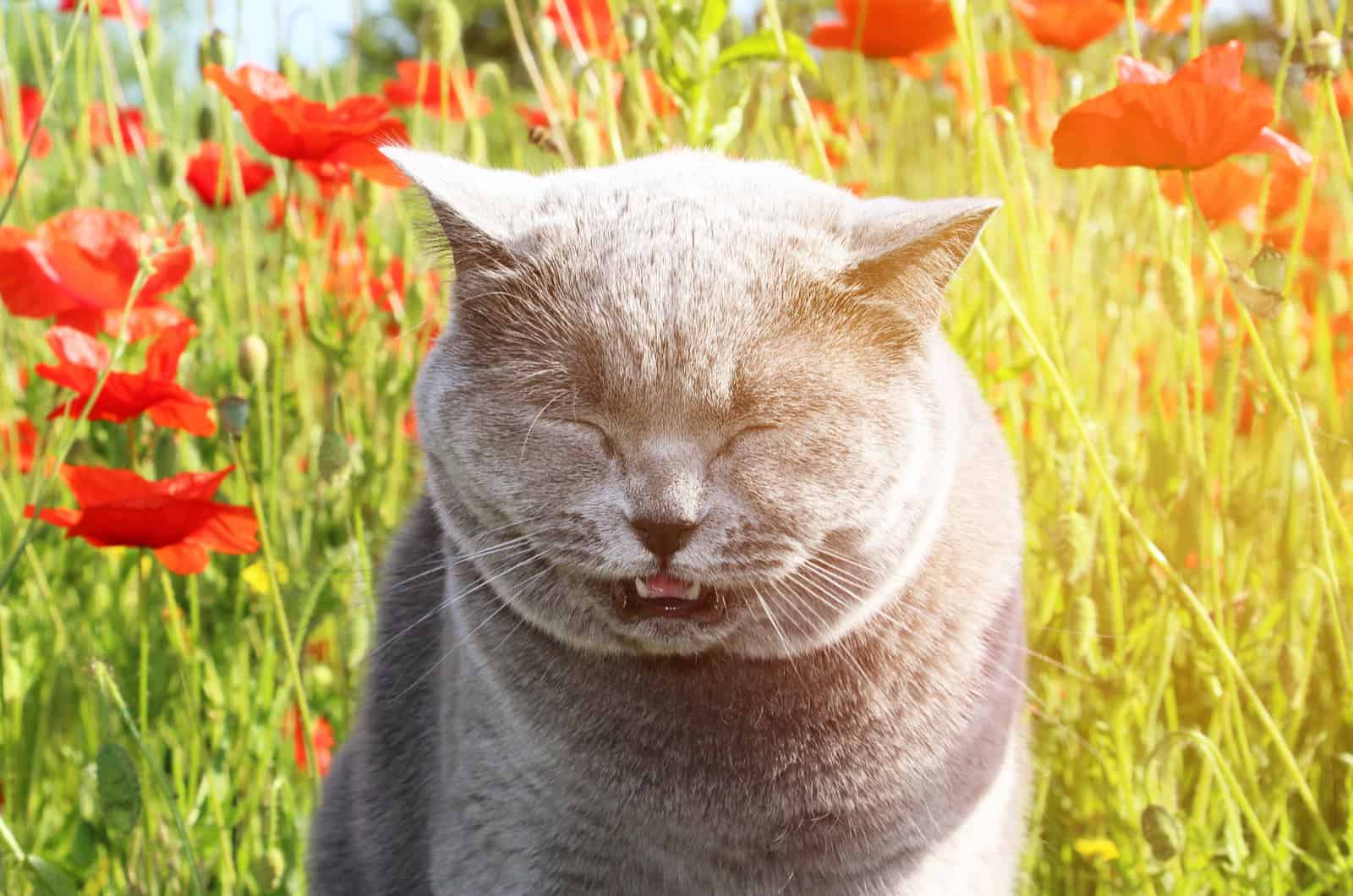
You might have noticed your cat sneezing more than usual. Of course, an occasional sneeze now and then is perfectly normal.
However, what if your cat is having frequent sneezing fits and it’s starting to worry you?
If your cat keeps sneezing but seems fine, there is probably nothing to be concerned about!
Your cat simply could have a little piece of dust or lint stuck in their little nose. Sneezing is your cat’s natural way of trying to get rid of something that shouldn’t be there in the first place!
If your cat continues sneezing for a longer period of time, I suggest you look out for other symptoms that can point you to what’s really going on with your cat’s health.
Although the cause of your cat’s sneezing is not likely to be serious, there are a few reasons for sneezing that might be a cause for concern.
Rest assured that a quick trip to the vet is the best way to get reassurance.
Continue reading to find out all about the possible causes of your cat sneezing.
My Cat Keeps Sneezing But Seems Fine – Should I Be Worried?
Your cat’s nose might be causing them some trouble. There are many possible causes of sneezing. For example, your cat might have a cold, a flea bite allergy or something simply stuck in their nose. Of course, not all causes are this benign.
To answer the question, in the vast majority of cases, you should not be worried.
However, not being worried does not mean letting your pet sneeze continuously with no treatment. It just means that your pet most likely is not suffering from anything serious.
On one hand, your cat might be sneezing just because some lint is tickling the nasal passage. On the other hand, there are a few serious conditions such as feline upper respiratory infection, rhinitis and nasal polyps (among others) that can also make your pet sneeze.
Most Probable Causes Of Your Cat Sneezing
Below, you will find the most common causes of your cat sneezing. Let’s get right into it!
1. Something Is Simply Stuck In Your Cat’s Nose
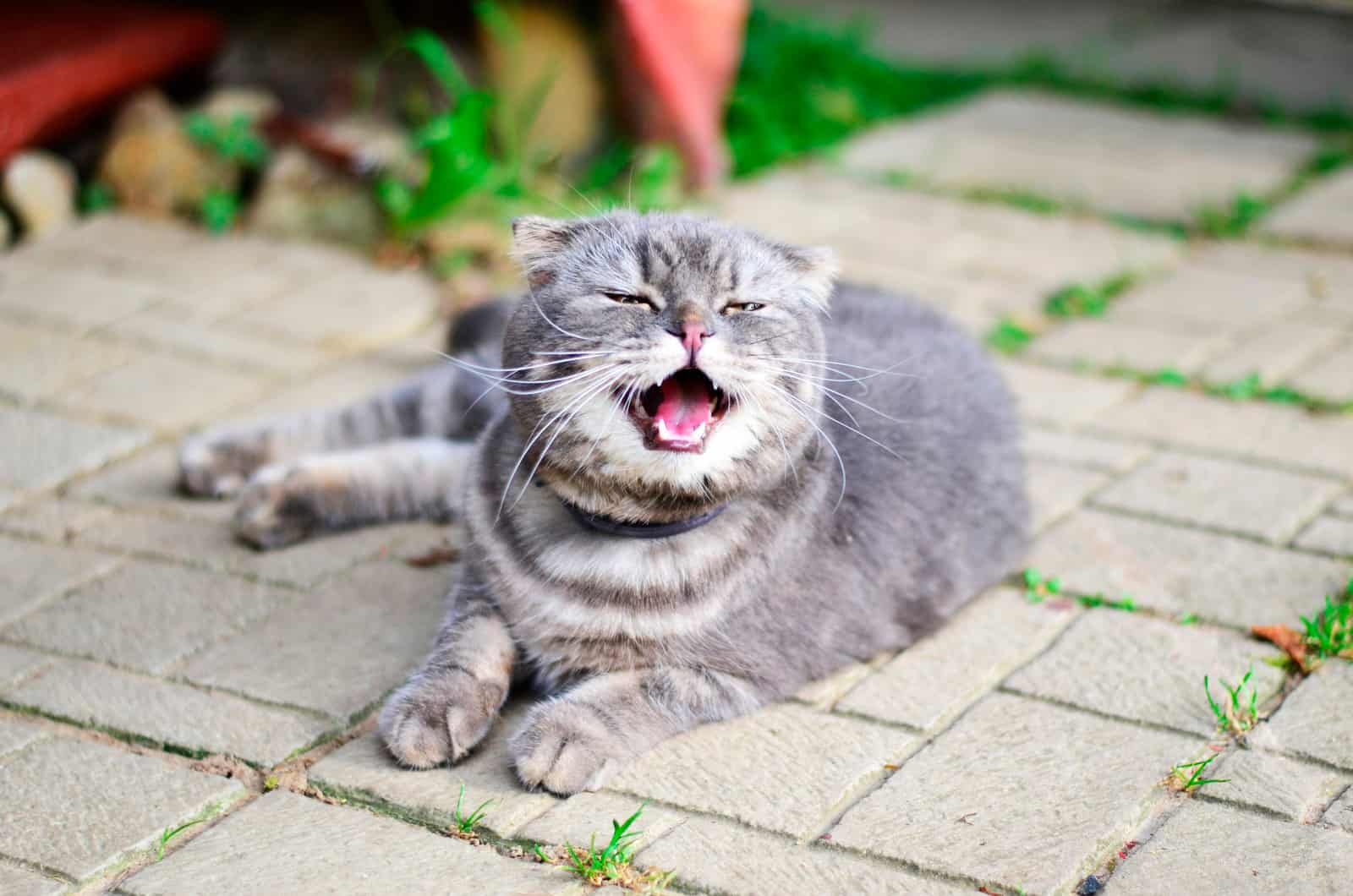
Your cat sneezing with no other symptoms usually points to a very simple cause. Essentially, your cat might have something stuck in its nose.
Sneezing is a natural reflex; it’s your cat’s way of displacing any foreign body that may be stuck in there.
A simple nose tickle can be due to:
• a piece of yarn
• a piece of lint
• a small feather
• a small hairball
• any thing small enough to get stuck in your cat’s nose
Small things like this can (somehow) be inhaled, thereby causing nose irritation and subsequent sneezing as a way to get rid of it.
These foreign bodies will fall out on their own or be released by sneezing. Either way, your cat should not have any other symptoms aside from the sneezing and maybe some eye watering and nose running.
This type of sneezing starts all of a sudden and ends as soon as the nasal canal is free of the foreign body. It may take a few minutes or a few hours for the sneezing to stop, depending on how long it takes to get rid of the irritant.
So, there is no reason for you to be worried!
2. It Can Be A Vaccine Side – Effect
Has your cat had a vaccine recently?
If the answer is yes, then this might be the cause of your cat’s sneezing fits. Every vaccine has potential side effects after being administered. Sneezing is one of the milder ones.
Sneezing is a possible side effect of intranasal vaccines ( vaccines sprayed or given in drops directly in the nose).
Your cat might also experience other symptoms similar to a cat cold (described further below in the article).
There is no reason for concern here, as the cause of the cat cold-like symptoms are not viruses or bacteria as they are with the real cat cold. The sneezing should go away on its own in a day or two.
3. Allergies
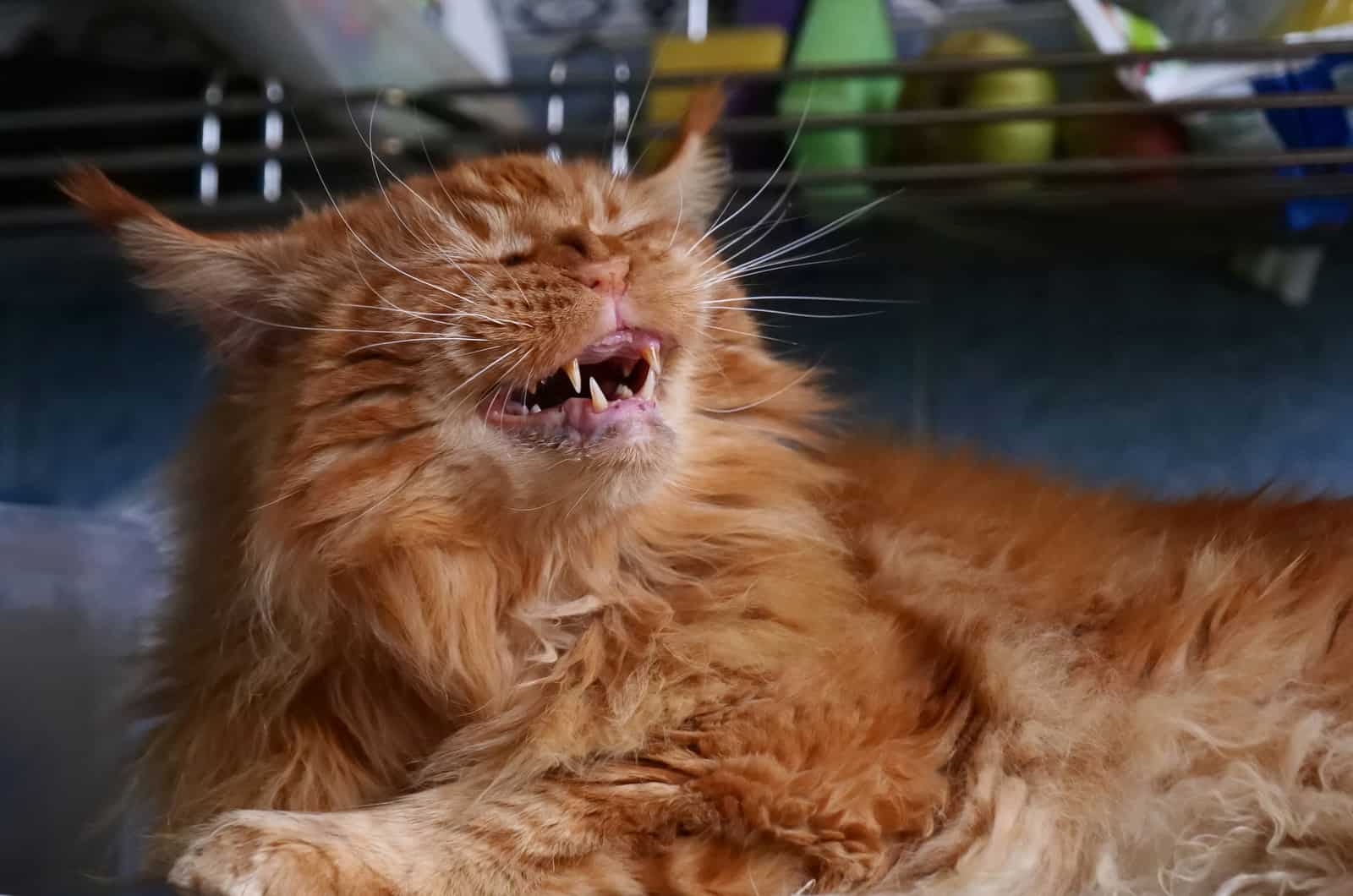
Some cats are prone to allergies. The most prominent causes of allergic reactions are inhaled irritants.
Allergen presence causes a large immune response, and possible symptoms include:
• frequent sneezing
• nasal congestion
• coughing
• wheezing
• skin rash
• itchy eyes
• some other symptoms
Some cats (although it is extremely rare) can have sneezing as their only allergy symptom. Allergies are usually associated with a range of other symptoms.
The symptoms are mostly mild, but some cats can have serious allergic reactions and this can be very dangerous for them.
What Could Be An Allergen?
The most common allergens are:
• pollen
• dust
• fungi
• cigarette smoke
• specific types of cat litter
• dust from cat litter
• food ingredients
• flea bites
• chemicals from a cleaning product
• chemicals from an insect spray
• chemicals in a perfume
4. Your Cat Might Have A Cat Cold
Feline upper respiratory infection (otherwise known as a cat cold) is an infection that can be caused by viruses or bacteria. URI in cats has very similar symptoms as the common cold in humans.
Your cat’s frequent sneezing can be the first sign that your cat has a cat cold, with other symptoms soon to follow.
Cat flu recovery time is around 5 to 10 days for mild cases, but it can last up to 6 weeks and, in particularly severe cases, 9 weeks. The duration of the condition often depends on the type of virus or bacterial infection causing the symptoms.
What Are The Symptoms Of A Cat Cold?
Some other symptoms of feline URI (apart from sneezing) are:
• Nasal discharge
• Eye discharge
• Blocked nasal passages
• Runny nose
• Drooling
• Mouth ulcers
• Loss of appetite
• Not eating
• Lethargy
What Causes Feline URI ?
Feline URI can be caused by either viruses or bacteria.
The most common viral causes are feline herpesvirus type-1 and feline calicivirus. They account for 90% of all cat colds. If they are the cause, the infection is called a cat flu.
When it comes to bacteria, Bordetella and Chlamydophila felis are the likely culprits.
5. Other Not So Common Causes Of Cat Sneezing
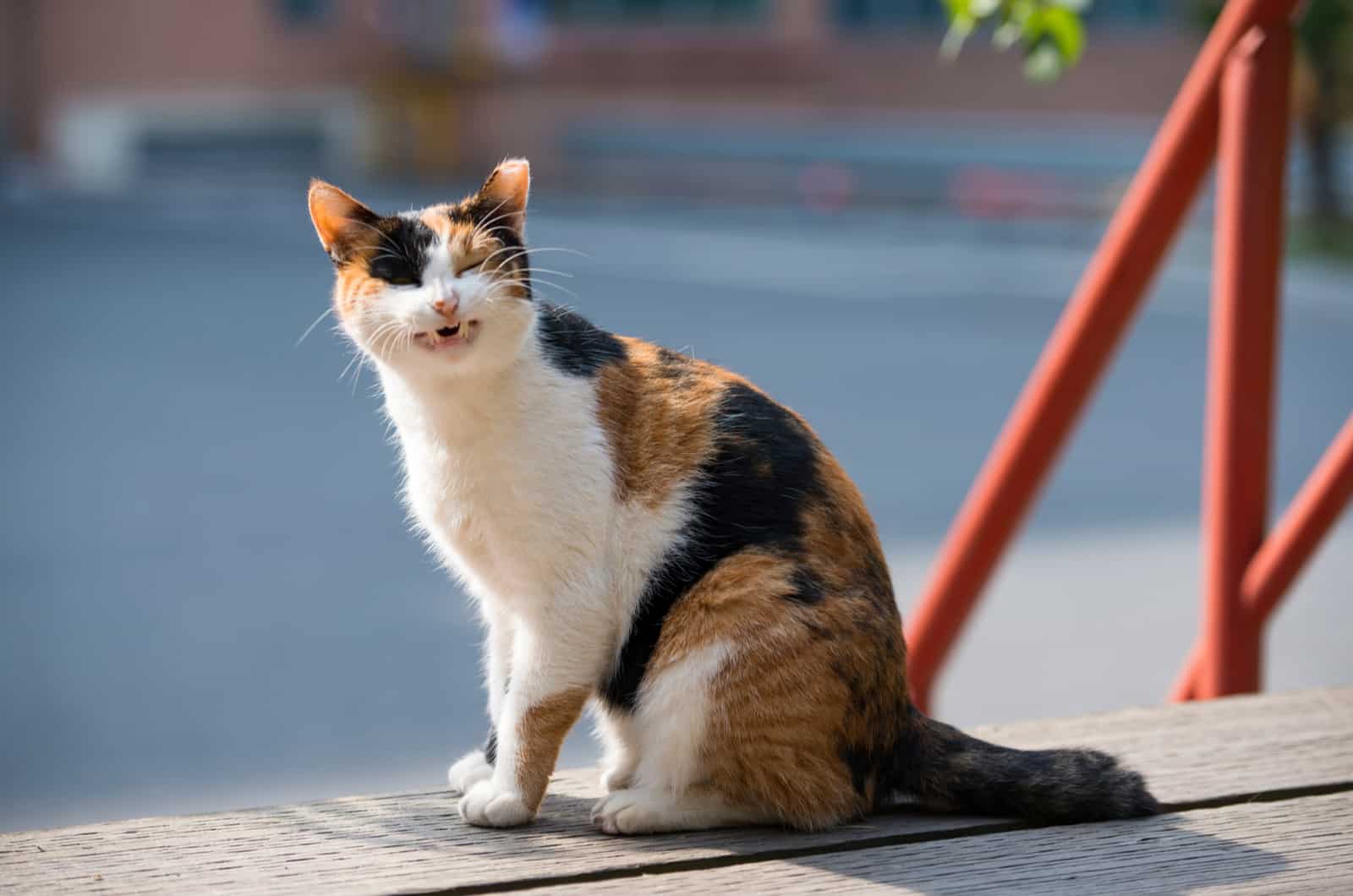
Here are some rare, but possible, causes of your cat sneezing. These conditions have sneezing as one of their symptoms, so they must be mentioned.
a) Feline Immunodeficiency Virus (FIV)
Feline immunodeficiency virus is a widespread virus in the feline world, but luckily it’s not a common one!
FIV does a lot of damage to a cat’s immune system. It makes it weak and unable to fight off bacteria, viruses, fungi, or any other possible threat.
When this immune barrier is broken, the cat’s body becomes susceptible to every possible disease.
A bacteria that would usually be killed quickly and efficiently by the cat’s immune system now has “open access” to do whatever it pleases, and this is bad news for the cat.
It works in the same way as the human immunodeficiency virus (HIV). A virus can enter a cat’s body and “lay low” for years until it starts doing damage and causing symptoms.
When symptoms appear, feline AIDS (acquired immunodeficiency syndrome of cats) is diagnosed. The mode of action and symptoms are essentially the same as AIDS in humans.
As the virus progresses to cause damage, the cat becomes susceptible to secondary bacterial infections that are not the result of the virus itself, but rather the inability of the immune system to defend itself.
Symptoms tied to feline AIDS:
• Frequent occurrences of infections and diseases
• loss of appetite
• weight loss
• lethargy
b) Feline Rhinitis and Sinusitis
Rhinitis is inflammation of the mucous membrane of a cat’s nose. Sinusitis is the inflammation of the sinuses. Both of these conditions produce the same symptoms as a cat cold.
They both have the same symptoms in the early stages, including:
• nasal congestion
• nasal discharge
• nasal passage swelling
• difficulty breathing
• watery eyes
• other similar symptoms
Both diseases can be caused by allergens, feline herpesvirus, feline calicivirus, bacterial infections, and fungal infections.
c) Dental Disease
In cats (and many other species), the roots of the teeth of the upper jaw are connected with the nasal passages.
This means that when a tooth gets infected, the nasal passage can be affected, causing your cat to sneeze, alongside some other possible symptoms.
d) Nasal Polyps
Nasal Polyps are small growths that produce the same symptoms as an upper respiratory infection (feline URI ). They can become larger in time, causing nasal blockage.
Other symptoms include frequent sneezing and loud breathing.
e) Feline Nasal Tumor
Feline nasal tumors are extremely rare. Tumors themselves are not a common occurrence, and nasal tumors form only 1% of all cat tumors.
Other symptoms of nasal tumors, apart from sneezing, include:
• nasal discharge
• nasal obstruction
• energy loss
• weight loss
f) Feline Leukemia Virus
Feline leukemia is caused by the feline leukemia virus. Apart from feline leukemia, this virus causes a range of other diseases.
One of those diseases is upper respiratory tract infection, which also causes sneezing, as well as other symptoms.
Why Is My Cat Sneezing With No Other Symptoms?
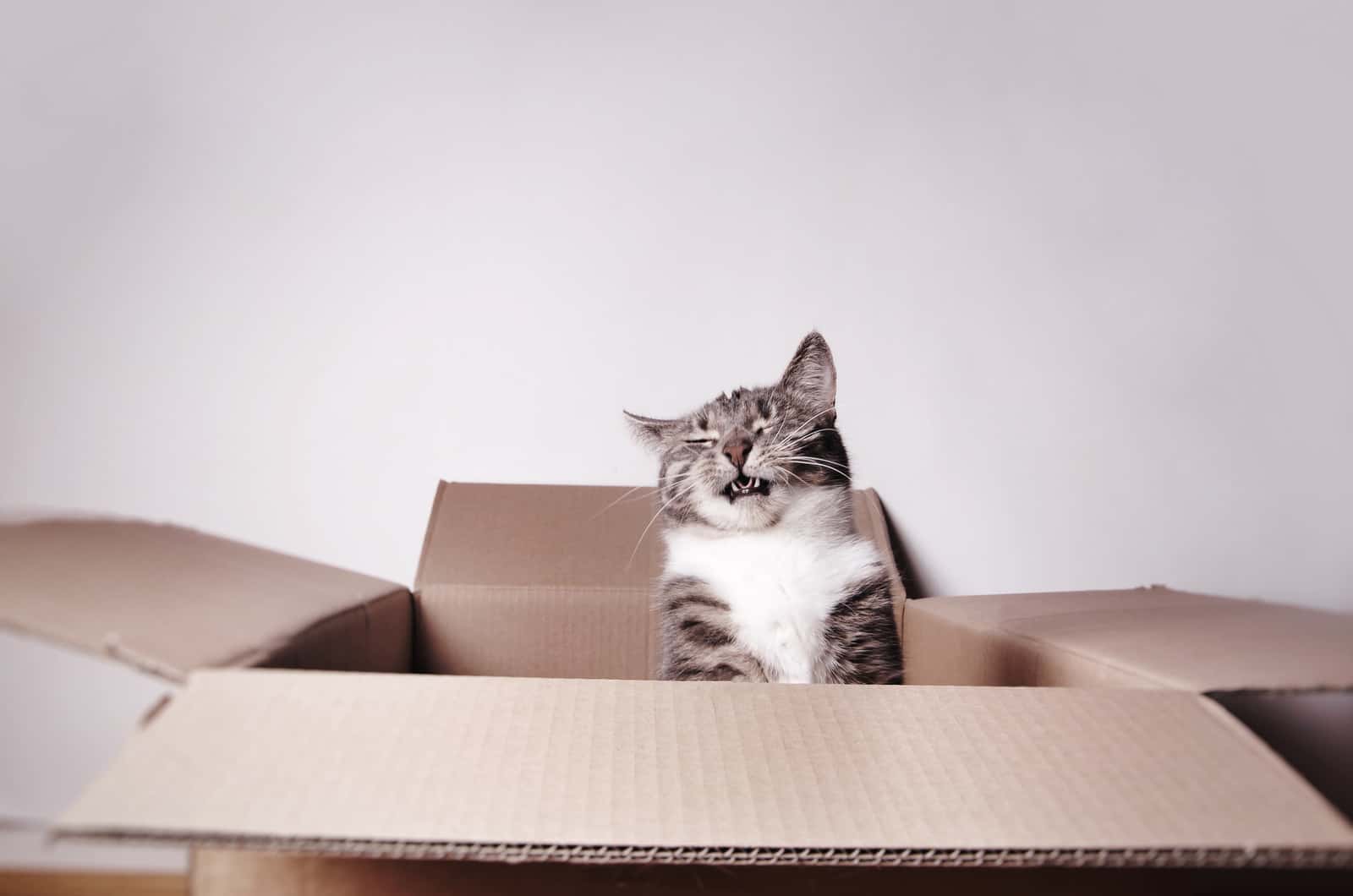
You may be worried after reading the last section and I understand completely! These infections and diseases sound (and are) quite scary. The important thing to remember is – that sneezing is not the main symptom and there are almost always other symptoms present.
If your cat is only sneezing and does not show any other symptoms, there is no reason for concern!
Your cat probably has some foreign object stuck in the nose and is trying to dislodge it by sneezing, which is a natural instinct.
The other possible answer is an allergy, as this can manifest in sneezing, with or without other symptoms
You do need to keep an eye on your cat for a few days, just to see if any other symptoms develop that might indicate one of the more serious causes of sneezing. There is always a possibility of new symptoms developing, especially if the sneezing is frequent and does not seem to go away.
When Should I Worry About My Cat Sneezing?
If your cat has no other symptoms or other symptoms are present in a mild form, just keep an eye on your cat.
Paying attention to your cat’s health is important in order to recognize if the symptoms are easing or getting worse.
If the cat is sneezing very frequently or sneezes some form of discharge or even blood, you need to go to the vet!
Also, if your cat develops other serious symptoms apart from sneezing (not eating, intense coughing, etc.), that’s another sign to visit the vet.
There is most probably nothing to be overly concerned about, but going to the vet is the right thing to do!
What To Do If Your Cat Is Sneezing And How To Prevent It
What you should do about your cat’s sneezing and how to prevent it depends on the cause of sneezing.
Let’s look at what you should do for each of the possible causes of sneezing.
1. If Your Cat Is Sneezing Because Something Is Stuck In Their Nose
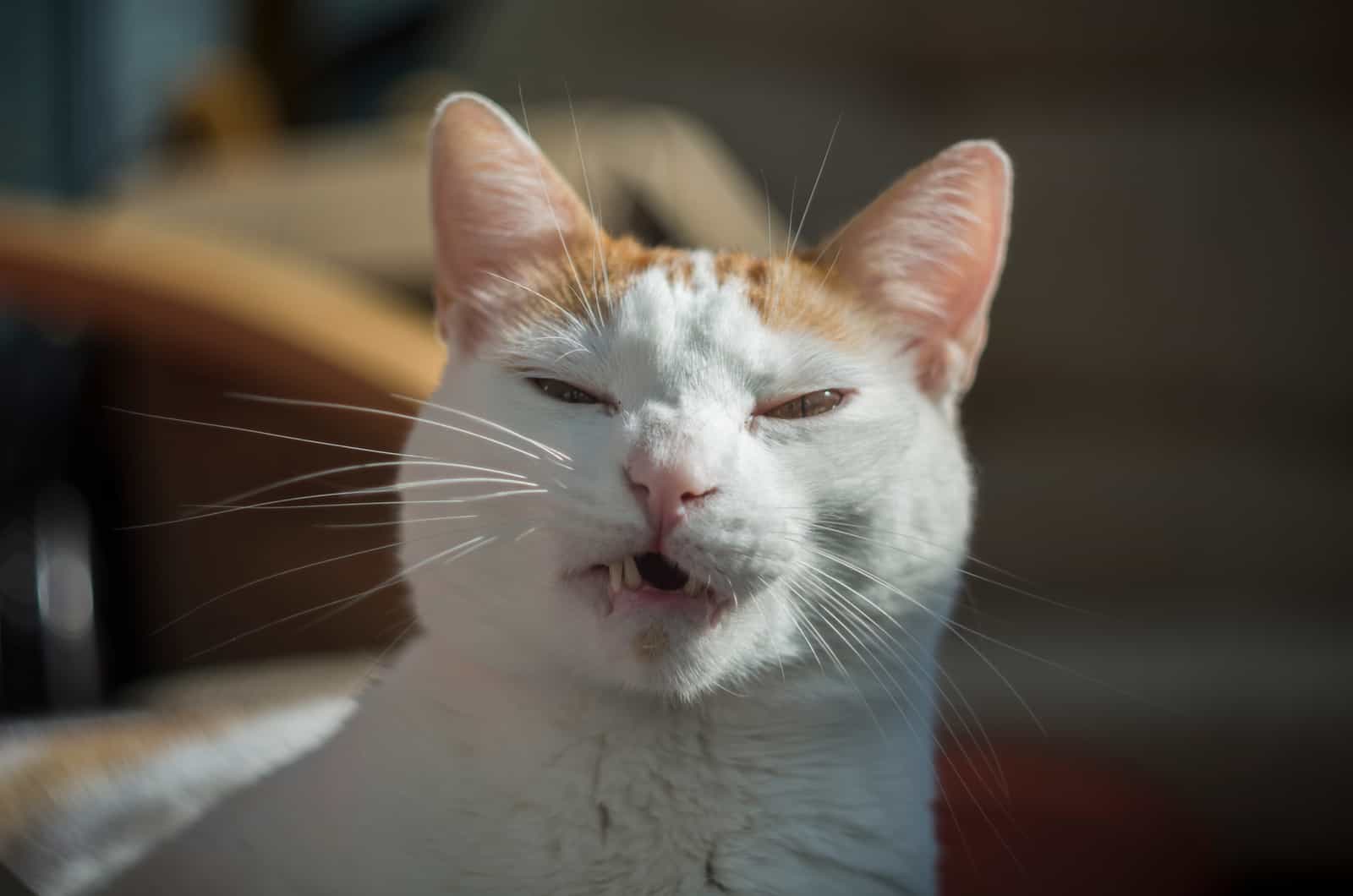
Your cat might be sneezing due to a piece of lint or a tiny feather that has managed to find its way inside the cat’s nose.
What To Do?
If your cat has something stuck in its nasal cavity, you should first let the cat try to get it out by sneezing. Sneezing is a natural reaction with the goal of displacing and getting the foreign body out of the nose.
Just sneezing will work in the vast majority of cases, so there is no need for human intervention.
How To Prevent It?
Well, you cannot. These instances are rare and random, so there is nothing you can really do to prevent them from happening.
2. If Your Cat Just Had A Vaccine
Sneezing can be a side-effect of vaccine administration.
What To Do?
You cannot do anything really. The sneezing and other possible symptoms will pass in a day of two. If they get worse, visit the vet. But chances for this are low, so do not worry much.
How To Prevent It?
You cannot.
If your cat has had a bad reaction to a vaccine, tell your vet about it before the next vaccination.
3. If Your Cat Has Allergies
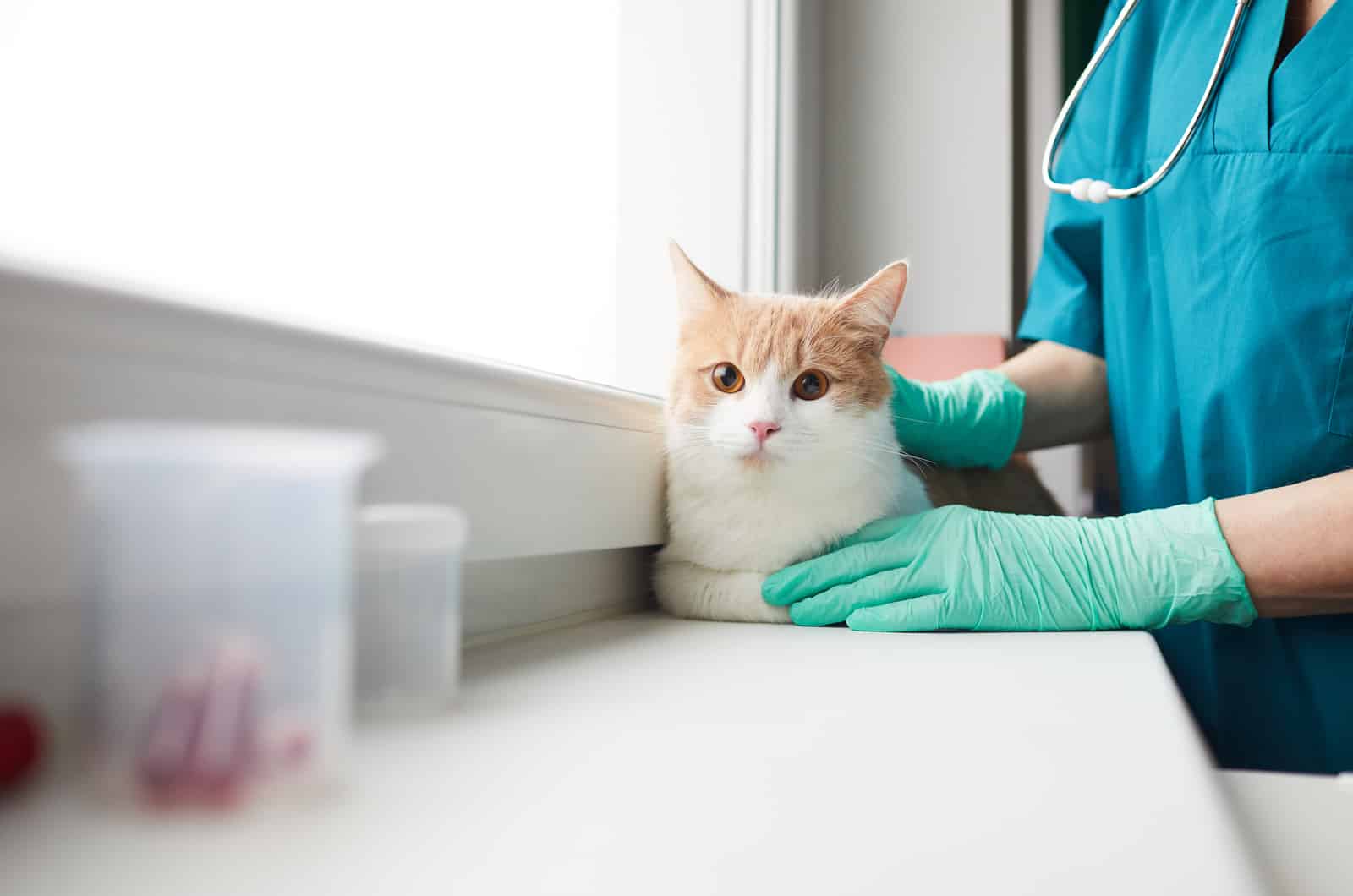
Your cat might be sensitive to different allergens, such as pollen, fungi, cat litter dust, different chemicals in cleaning products, and many other things.
What To Do?
Cat allergies cannot be cured. Allergies can only be managed by reducing the severity of the symptoms.
If you believe your cat is sneezing due to some allergen’s presence, then first you need to find out which allergen it is.
A veterinarian or a veterinary dermatologist can determine what exactly your cat is allergic to.
How To Prevent It?
When you find out what your cat is allergic to, you can take steps in order to remove the allergen from the cat’s surroundings and diet.
Without the irritant being present, your cat will not have an allergic response to it.
For example, if your cat is allergic to a specific food component, you should remove the food items that contain that ingredient from the cat’s diet. Also, if you know your cat is allergic to a specific cleaning product, do not use it again.
Essentially, the goal is to create an allergen -free environment for your cat!
4. If Your Cat Has A Cat Cold
Sneezing is one of the tell-tale signs that your cat has an upper respiratory infection.
What To Do?
1. Act Fast!
Treat the cold right away. If you treat it on time, you will stop the condition from worsening.
The usual recovery time is from 5 to 10 days, but more complicated cases can last as long as 6 weeks. In order to shorten the recovery time, act as soon as you notice the symptoms!
2. Go To The Vet
The vet will find out the cause of your cat’s respiratory infection via blood or urine tests.
If the cause of your cat’s cold is a virus, your cat will get antiviral medication. If it’s bacterial, antibiotics will be prescribed.
If your cat is really not well and the respiratory disease doesn’t seem to go away, a chest x-ray might be performed in order to find out exactly what’s going on.
If your cat completely stopped eating and drinking, it may need nutritional support provided in the form of a feeding tube or intravenous fluids.
3. Symptom – Relieving
There is really not a lot you can do with natural remedies, as viruses and bacteria are quite feisty and hard to get rid of.
Your cat will need “proper medication”, so go to the vet so they can prescribe them.
You can only relieve the symptoms by using a humidifier, making breathing easier for your cat. Also, wiping your cat’s face to clean the eye and nose discharge can be helpful.
4. Vaccination
Vaccination is recommended to be administered as young as 6 weeks old.
Your cat should be vaccinated against feline calicivirus, feline herpes virus, Bordetella, and some others (not related to cat cold ).
How To Prevent A Cat Cold?
The only thing you can do is to keep your cat away from other infected cats.
There is really no way of knowing which cat might be infected, but if you notice your friend’s cat has some symptoms, delay the playdate until another time!
5. If The Cause Is Something Apart From The Mentioned Common Causes
Feline AIDS, rhinitis, sinusitis, dental disease, nasal polyps, nasal tumor, and feline leukemia have been mentioned as unlikely causes of your cat sneezing.
What To Do?
Here, the only thing you can do is let the veterinary professional take charge.
• Feline AIDS is incurable, but medication to relieve the symptoms is available.
• If the cause is kidney disease, there are various treatments, depending on the severity and stage of progression of the disease.
• Rhinitis and sinusitis are diagnosed by a vet, sometimes even by a rhinoscopy. Medication exists for this and your vet will know which one your cat should use.
• When it comes to nasal polyps, they are usually removed under general anesthesia.
• When talking about feline nasal tumors, you can expect the treatment to be radiation and/or chemotherapy. Removal surgery is usually not the first option, as it is quite complicated.
How To Prevent It?
• Feline immunodeficiency virus spreads via a bite from an infected cat. The infected cat is most often an aggressive male stray cat.
The only way to prevent infection in your cat is to prevent it from having fights with other cats. This is easier said than done, but just stop your house cat from roaming the streets, since other dangers are out there, apart from cat fights.
• The same goes for feline leukemia, as it is also spread via a bite from another infected cat.
• Preventing dental disease in cats involves maintaining dental hygiene and teeth health.
• There are a few ways to prevent kidney disease, which mainly involve maintaining a healthy cat diet.
• There are no known ways to prevent nasal tumors and nasal polyps.
Frequently Asked Questions
1. Why Is My Cat Sneezing So Much All Of A Sudden?
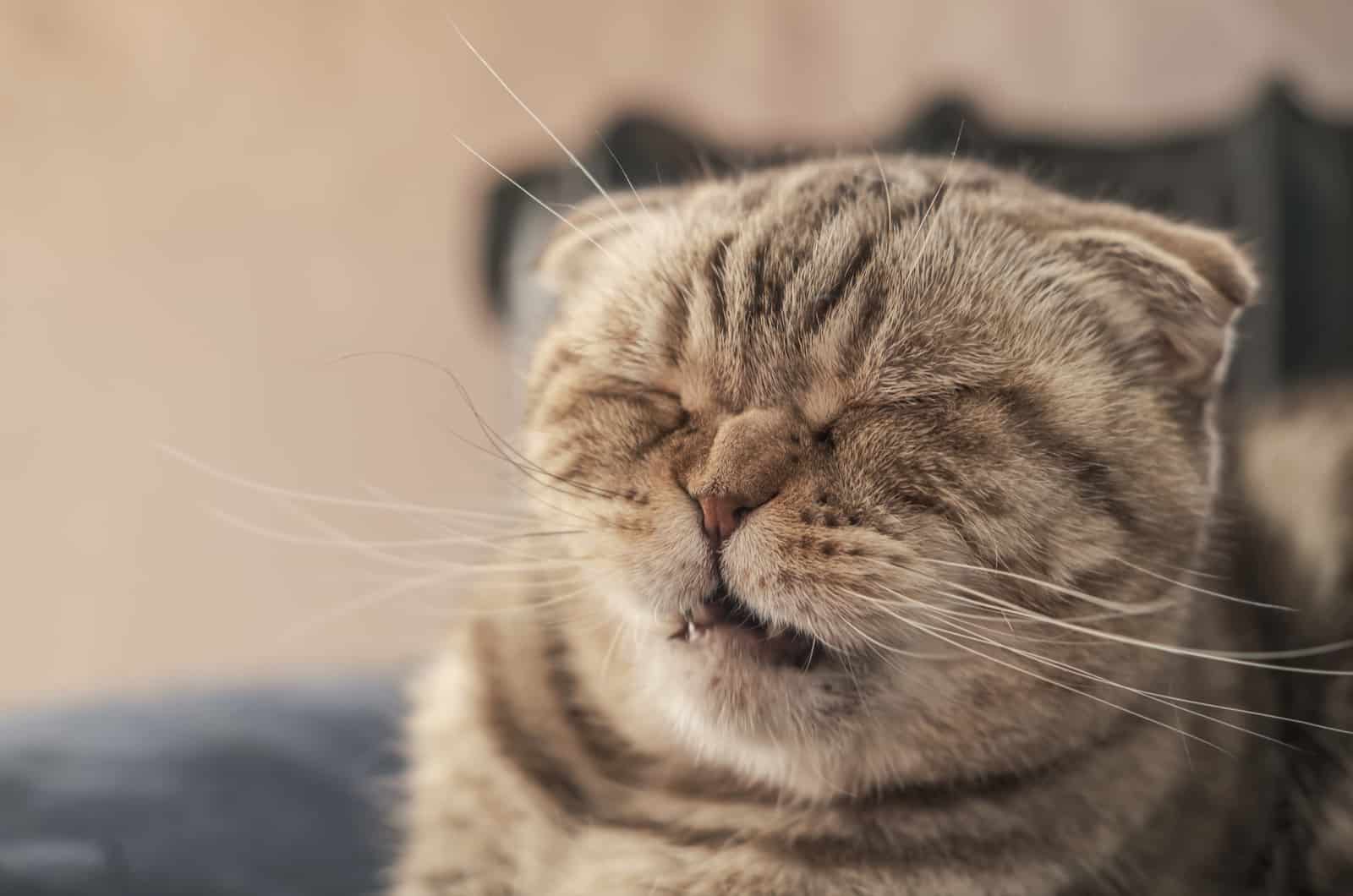
As we have seen, there are a number of reasons why your cat keeps sneezing. Some pose no reason for concern, while others might be alarming.
Your cat having something stuck in their nose, a simple cat cold, or an allergy are the most likely causes of your cat’s sneezing fits.
I have listed other reasons which are possible but not very likely. The serious infections and diseases mentioned in this article need to be diagnosed and managed by a vet.
Either way, your cat will be completely fine with proper care (if care is even needed), so do not worry much!
2. What Can I Do For A Cat That Keeps Sneezing?
There are a few things you can do, such as finding the cause of sneezing, symptom-relieving and trying to prevent sneezing as a symptom in the first place.
The best thing you can do is to try to find the cause of the sneezing, maybe with the vet’s help!
Is it mold? Is it a flea bite allergy? Is something stuck in your cat’s nose? Did your cat catch a cat cold? Is there something more serious going on?
You will know better what to do after the cause is found.
3. What Can I Give My Cat For Sneezing?
This depends on the circumstances.
Let’s say you know your cat is allergic to pollen and you know from previous experience that a specific medicine eases the symptoms and it works well for your cat. In this case, feel free to give your cat that medicine as it will help them.
If you don’t know the cause of your cat sneezing, it’s best you don’t experiment with different medication and treatments, as this can back-fire and actually harm your cat.
It can happen that your cat has a cat cold caused by a virus and you think giving antibiotics will help cure the cold. It will not, since antibiotics are made to treat bacteria and not viruses.
If you notice the sneezing is persistent, accompanied by other symptoms and does not go away after a day or two,visiting the vet is the best choice for your cat!
4. What Are Some Signs That A Cat Is Sick?
If your cat is sick, it will usually have some observable symptoms. The type of symptoms and the severity of them really depends on your cat’s illness.
Different diseases can have completely different symptoms, but often, different diseases share many of the same symptoms.
General signs your cat is not feeling well include:
• loss of energy
• weight loss
• not being social
• change in appetite
• vomiting and diarrhea
• presence of nose discharge
Depending on how fast these symptoms develop and their severity, you can decide on whether to go to the vet or not. Of course, if there are a lot of symptoms, they appear suddenly, or are intensive – go to the vet as soon as possible!
Conclusion
Every cat sneezes once in a while. If the sneezing is frequent and doesn’t stop after some time, there may be an underlying issue.
If your cat keeps sneezing but seems fine, there is most likely nothing to worry about! It could be a simple pollen allergy or something stuck in your cat’s nose.
Sneezing may seem like a minor issue, but it can be just a symptom of a more serious disease that your cat is dealing with.
You will recognize if your cat has been sneezing more than usual. Pay attention to other symptoms your cat might be exhibiting, as they can be clues as to what’s happening with your cat’s health.
If the sneezing doesn’t go away and other symptoms appear, I suggest you visit a veterinary office. They will investigate and tell you the cause of your cat’s sneezing, what to do about it, which treatment option is best, or they may reassure you that you don’t need to do anything and just let the sneezing go away on its own.
Either way, if you notice your cat’s sneezing is getting out of hand and you tried everything you can do to stop it, visit a vet please!
Most of the diseases mentioned above are very common, so I am sure your feline friend will be completely fine, just take a quick trip to the vet to be 100% sure!

